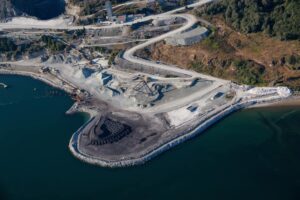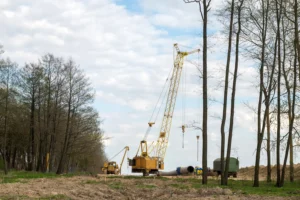In today’s infrastructure landscape, construction is no longer just about materials, manpower, and machinery. It’s about alignment. Projects that succeed do so because they align technical requirements with the long-term goals of the client. At Industra, we see construction management (CM) as the tool that makes this possible and when done well, brings clarity, control, and confidence to even the most complex builds.
Whether managing the replacement of a critical pump station, constructing a water treatment facility, or delivering a multi-phase institutional build, our approach to CM begins with one priority: the client.
Let’s explore how client-focused construction management improves project performance, prevents costly missteps, and supports long-term success across municipal, industrial, and institutional sectors.
What Client-Focused Construction Management Means
Construction management is often described as a coordination role — managing contractors, controlling schedules, and monitoring budgets. While these are important, they only scratch the surface.
Client-focused construction management goes further. It starts at the strategic level, long before construction begins, and continues through to occupancy and beyond. It means guiding decisions based on client objectives, not just technical feasibility. It means solving problems with the client’s long-term operational, financial, regulatory, and environmental needs in mind.
At Industra, client-focused CM involves early engagement in the project lifecycle. This includes pre-construction planning, constructability reviews, value engineering, and risk analysis. It continues during construction through tight schedule control, trade coordination, and transparent cost management. And it finishes with a strong handover: commissioning, training, and close-out support that ensure operational readiness.
This approach reflects a simple truth: buildings and infrastructure exist to serve people, not blueprints. Our job is to ensure our clients are supported from start to finish.
How Industra Delivers Client-Focused CM
With offices across British Columbia, Ontario, and the Northwest Territories, Industra manages construction in diverse settings including dense urban cores to remote Indigenous communities, coastal marine environments, and industrial zones. Our success across these varied landscapes comes down to one thing: a consistent, hands-on, client-focused approach to construction management.
- Early engagement with stakeholders: Our teams are involved from day one. We collaborate closely with engineers, owner representatives, and permitting authorities to ensure alignment from the outset and eliminate downstream issues.
- Proactive budget tracking: As designs evolve, we track cost implications in real time. This prevents budget overruns and ensures clients maintain financial control throughout the process.
- Strategic scheduling: We plan delivery schedules around key project variables such as site access, seasonal limitations, and environmental regulations to avoid costly delays.
- Integrated coordination: Utilities, foundations, mechanical systems, and finishes are all sequenced with a long-term view. We prioritize operational performance and maintenance ease, not just construction speed.
- Self-perform flexibility: Industra retains the ability to self-execute key scopes of work. This helps us maintain quality control, keep projects on schedule, and adapt quickly when working in remote or constrained environments.
This disciplined, client-aligned methodology is what makes our CM services effective and why many clients trust Industra with their most complex, high-risk projects.
The Value of CM Across the Project Lifecycle
To understand the full value of construction management, it helps to break it down across each major project phase. Here’s how CM supports client success from start to finish:
| Project Phase | Key Construction Management Contributions | Client Benefits |
| Pre-Construction | Feasibility review, budgeting, schedule forecasting, permitting support | Aligns project scope with budget and regulatory timeline |
| Design Coordination | Constructability analysis, value engineering, procurement planning | Reduces design conflicts, improves buildability |
| Construction Execution | Daily site coordination, safety enforcement, cost tracking | Prevents delays, improves safety, ensures cost control |
| Commissioning & Turnover | Systems testing, operator training, documentation, close-out | Ensures facility readiness, reduces post-construction issues |
This structured yet flexible approach creates consistency across our portfolio. Whether working in Surrey, Yellowknife, or Toronto, the same process ensures quality, safety, and client satisfaction.
Sector-Specific Construction Management Insights
Client-focused CM may follow consistent principles, but its application must vary depending on the sector. Here’s how our approach adapts to the unique challenges of key markets we serve.
Municipal Infrastructure
Municipal clients are responsible for delivering essential services to the public — water, sanitation, transportation, and more. Construction projects in this space often face intense scrutiny, from elected officials, ratepayers, and regulators.
Industra’s construction management services for municipal projects emphasize transparency, compliance, and schedule control. For example, in pump station replacements or treatment plant upgrades, we manage bypass pumping logistics, coordinate environmental permitting, and minimize service disruptions.
Our article on what municipalities should know before starting a pump station replacement offers a deeper look at how CM supports municipal goals during high-stakes infrastructure projects.
Industrial & Process Mechanical
In industrial projects, the focus is often on efficiency, integration, and precision. Downtime carries significant financial costs, and installations must align seamlessly with process requirements.
Our CM team works closely with engineers and facility managers to plan around shutdown windows, stage material deliveries, and execute installations with minimal disruption. Safety is paramount, especially when managing confined space entries, high-pressure systems, or complex mechanical tie-ins.
Industra’s hands-on coordination ensures that sequencing, quality control, and inspection processes align with operational needs.
Institutional Projects
Building hospitals, schools, and public buildings requires strict adherence to accessibility codes, safety regulations, and community expectations. These projects often involve multiple stakeholders, including city planners, architectural committees, and funding agencies.
In this environment, client-focused CM means maintaining regular updates, facilitating stakeholder meetings, and documenting progress thoroughly. Industra ensures quality control through continuous inspection, while also managing scope changes efficiently as project priorities evolve.
What to Look for in a Construction Management Partner
Choosing a CM firm isn’t just about capacity. It’s about fit. The right partner brings a mix of technical capability, project experience, and cultural alignment with your team.
Key qualities to look for include:
- Relevant experience: Does the firm have proven results in your sector and region?
- Pre-construction capability: Can they support budgeting, value engineering, and risk planning from the start?
- Cost control systems: Do they offer real-time tracking, forecasting, and transparent reporting?
- Safety record: What systems and certifications are in place to ensure a safe jobsite?
- Self-perform flexibility: Can they self-execute key scopes to maintain control and quality?
- Communication standards: How often will they report to you? What format? Who’s your point of contact?
You can view examples of how Industra manages these elements on our Projects and Services pages.
Real-World Example: Water Infrastructure in a Remote Community
In a recent project, Industra was engaged to manage construction for a water treatment facility in a northern Indigenous community. Access was limited to one seasonal road, environmental regulations restricted excavation windows, and local labor resources were limited.
We began pre-construction planning six months in advance, working with local leaders, environmental consultants, and supply vendors. Our team staged equipment ahead of freeze-up, secured early permits, and arranged accommodations for key crews.
During execution, weather delays threatened to impact the mechanical installation timeline. Because Industra had self-perform capability in civil and structural trades, we resequenced work, maintained progress, and brought in supplementary labor without delaying completion.
Post-construction, our CM team managed the commissioning process, trained local operators, and delivered complete turnover documentation. The community gained access to reliable, treated water and the project was completed with zero safety incidents.
Why Client-Focused CM Delivers Better Results
Client-focused construction management is more than a buzzword. It’s a project delivery strategy grounded in accountability, flexibility, and foresight.
Here’s why it consistently delivers better results:
- Clients are engaged early and empowered to make informed decisions
- Scope, schedule, and budget stay aligned through change
- Stakeholders receive regular updates and transparent reporting
- Problems are solved before they become critical
- Facilities perform better long-term because lifecycle needs are considered during design and construction
An independent study by McKinsey & Company found that major capital projects using integrated, client-aligned teams were 15% more likely to meet schedule and cost targets (source).
Construction Management in Integrated Delivery Models
Industra frequently applies CM services within design-build and EPC (Engineering, Procurement, Construction) models. In these projects, the construction manager serves as the bridge between the engineering team and field execution.
This integrated role ensures that design decisions reflect constructability, budget, and risk. It also streamlines procurement, allowing early vendor engagement and material tracking.
Our blog on best practices for EPC design-build in complex projects outlines how CM ensures accountability in these fast-paced delivery models.
Final Thoughts: Why It Matters Now More Than Ever
Construction projects are only getting more complex. Environmental regulations are stricter. Labor markets are tighter. Material prices are more volatile. In this environment, the role of a construction manager is essential.
But it’s not enough to hire a firm that simply monitors trades and schedules. Clients need a CM partner who advocates, anticipates, adapts, and one who puts their goals first and delivers infrastructure that performs, not just on day one, but for decades to come.
At Industra, this is how we build. If you’re planning a project and want a partner who will align with your needs, communicate clearly, and deliver results, we invite you to contact us.
Let’s build something that works for you.

















